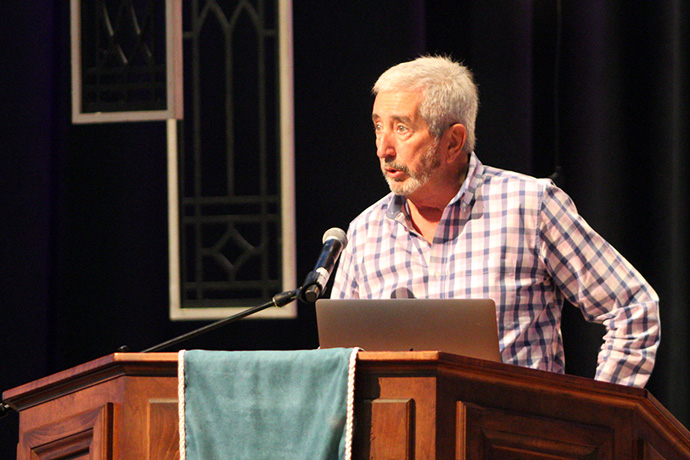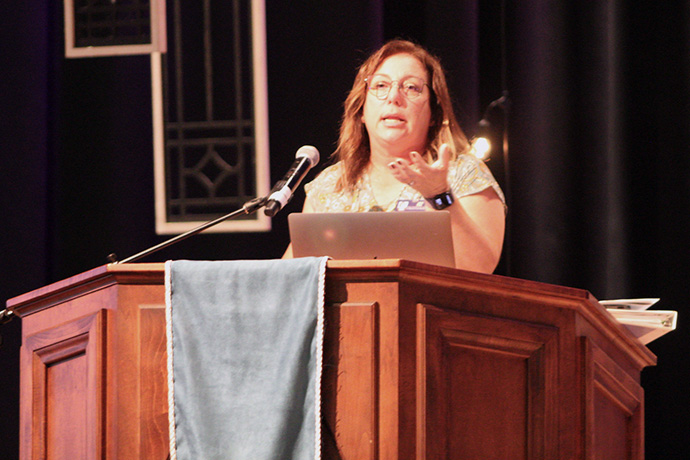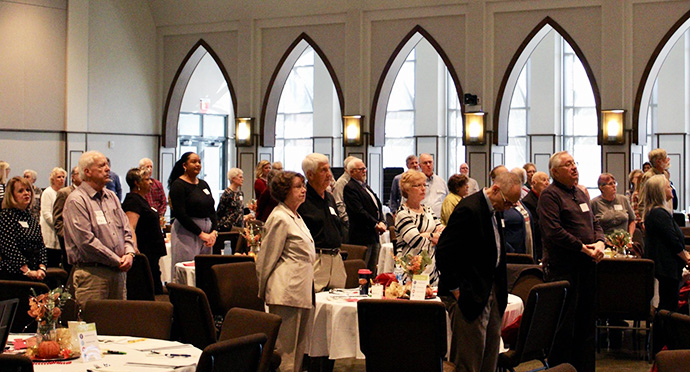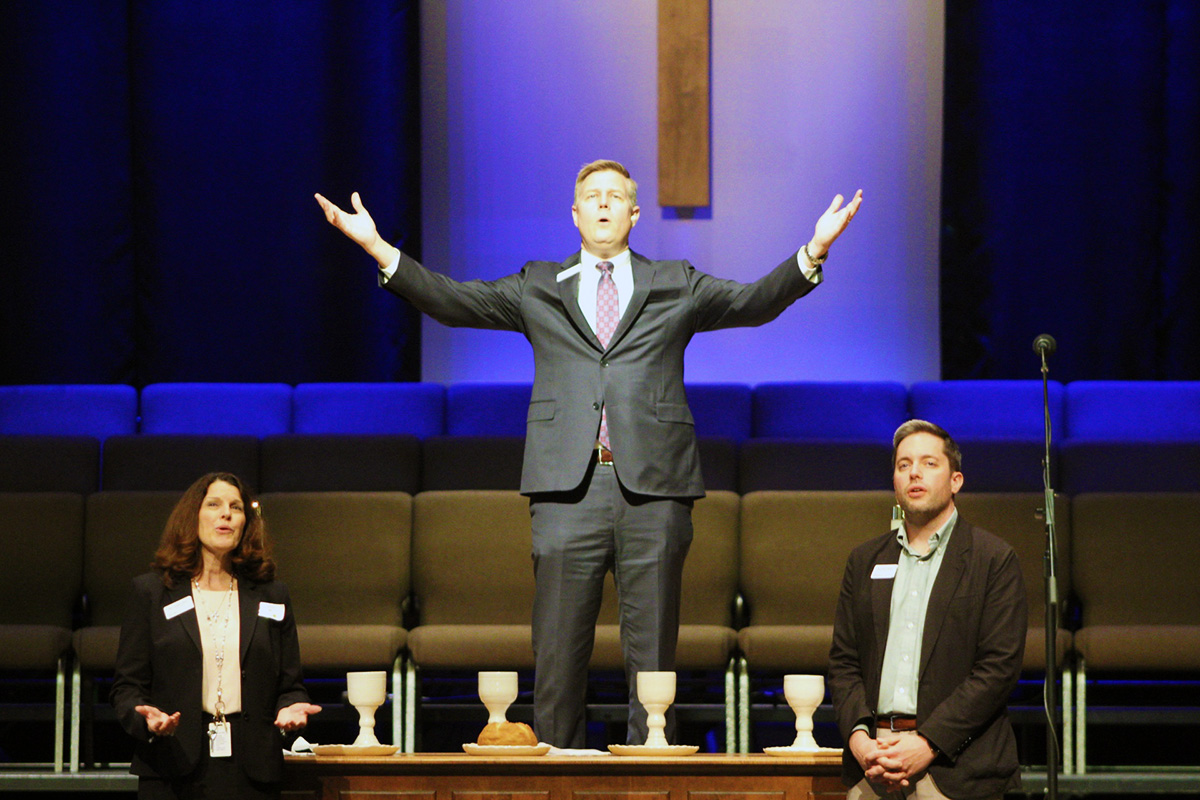Key points:
- Workshop brings together speakers on a wide variety of topics to resource both those in older adult ministry and older adults themselves — from health tips to handling legal issues like changing a will.
- The event was sponsored by ENCORE Ministry, the older adult ministry of the Tennessee-Western Kentucky Conference, in partnership with University of Tennessee Chattanooga’s School of Nursing.
- According to a statistic on ENCORE’s website, by 2030, the Tennessee-Western Kentucky Conference will be home to more than 600,000 adults over the age of 65 — an increase of 24% from today's population.
Churches can play a vital role in keeping older adults connected to their congregations and equipped to handle new challenges, say leaders of ENCORE Ministry, the older adult ministry of the Tennessee-Western Kentucky Conference.
For the first time since 2019, ENCORE Ministry was able to hold an in-person event. Meeting Oct. 26 at Franklin First United Methodist Church, “Building Community with Older Adults” brought together speakers on a wide variety of topics to resource both those in older adult ministry and older adults themselves — from physical and mental health tips to legal issues like properly writing or changing a will.

The event also was livestreamed, and online participants logged in from Alabama, Florida, Louisiana, Michigan, Hawaii, the Greater Northwest and Southern Nigeria.
According to a statistic on ENCORE’s website, by 2030, the Tennessee-Western Kentucky Conference will be home to more than 600,000 adults over the age of 65 — an increase of 24% from today's population.
“It’s important to face the reality that churches are full of people who are underutilized and maybe even marginalized,” said John Rivas, incoming executive director of ENCORE. “Older adults are easily overlooked because of their age. We hope ENCORE can provide space and opportunities for older adults to be valued.”
The event was a partnership between ENCORE Ministry and University of Tennessee Chattanooga’s School of Nursing. Kristi Wick, the school’s Vicky B. Gregg chair of gerontology, said the first-time partnership with ENCORE was beneficial because of the influence faith communities have.

“It’s a natural fit to partner with the faith community for education, support and to tap into local resources,” she said, adding that 85% of Tennesseans are involved in a religious community.
The Rev. Rick Gentzler, director of ENCORE, said that working with the university would expose older adults and leaders of older adult ministry to gifted and talented resources beyond the conference.
“The United Methodist Church is very much alive and engaged in ministry with folks of all ages,” he said. “We are resourcing churches.”
Watch workshop
A recording of the “Building Community with Older Adults” workshop is available on Franklin First United Methodist Church’s YouTube channel.
During her presentation, Wick outlined the challenges of an aging population with a shortage of care providers. She said churches can play an important role by offering intergenerational programs, transportation, respite programs or dementia-friendly programs.
Since many older adults experience social isolation, a welcoming congregation can be a lifeline.
“COVID highlighted the important need to touch each other, worship together — we all need social interaction,” Wick said.
Beth Janney, corporate director of memory care at Morning Pointe Senior Living in Ooltewah, Tennessee, expanded on that same point.
“Online worship is great, but people need to feel emotionally and physically connected to the Body of Christ,” she said.
Janney spoke on the need for congregations to adapt worship and physical space to accommodate those with physical disabilities or cognitive decline, who are prone to social isolation because their conditions create barriers to attending church.
She suggested holding services in places other than the main sanctuary, particularly if the sanctuary is difficult for someone in a wheelchair to sit close to the front. Churches should ensure their parking lots and restrooms are accessible to anyone with physical challenges.
Churches also can welcome those with cognitive decline by holding services in smaller spaces with fewer distractions and utilizing familiar worship elements and hymns, as someone with dementia may struggle with short-term memory but will remember a hymn they grew up singing.

Jessica Freeman, an assistant professor at the University of Tennessee Chattanooga, spoke about the growing trend of “grand families,” households where children are living with grandparents or even great-grandparents. She said that an estimated 2.7 million households in the U.S. are headed by a grandparent.
Freeman, who grew up living with grandparents, said that there are a number of legal issues, often regarding custody, that make such a living arrangement challenging. It could also put children in a role of caregiver if their grandparents have health issues, and there is the need for planning should the grandparent pass away before the child turns 18.
Subscribe to our
e-newsletter
She suggested that churches could help by writing letters of encouragement, offering respite care like child-sitting, or providing helpful acts of service like cooking, cleaning or mowing.
The Rev. Russell M. Morrow, senior pastor at Mullins United Methodist Church in Memphis, Tennessee, said this event will be helpful for him and his congregation.
“We’re here to help establish a strong ENCORE ministry in our church that is filled with elderly people — our oldest member is 105 years old,” he said. “It’s also good to know some things as we evolve through life.”
ENCORE Ministry is the official older adult ministry of the Tennessee-Western Kentucky Conference but does not receive funds from the conference. They provide training and support, quality resources and networking to equip church leaders for ministry by, with and for older adults, as well as grants for older adult ministries.
In its 10 years of existence, ENCORE has given out $1.3 million in grants for a variety of needs: to help churches purchase equipment to be in compliance with the Americans with Disabilities Act or make church renovations, as well as ministries of service to the community, such as food distribution.
“The UMC is a graying church. Many of our grants go to churches with 60% of membership being over 60 years of age,” said the Rev. Kent McNish, ENCORE’s outgoing executive director.
Jordan is a freelance reporter in Nashville, Tennessee.
News media contact: Julie Dwyer at (615) 742-5470 or newsdesk@umnews.org. To read more United Methodist news, subscribe to the free Daily or Weekly Digests.




